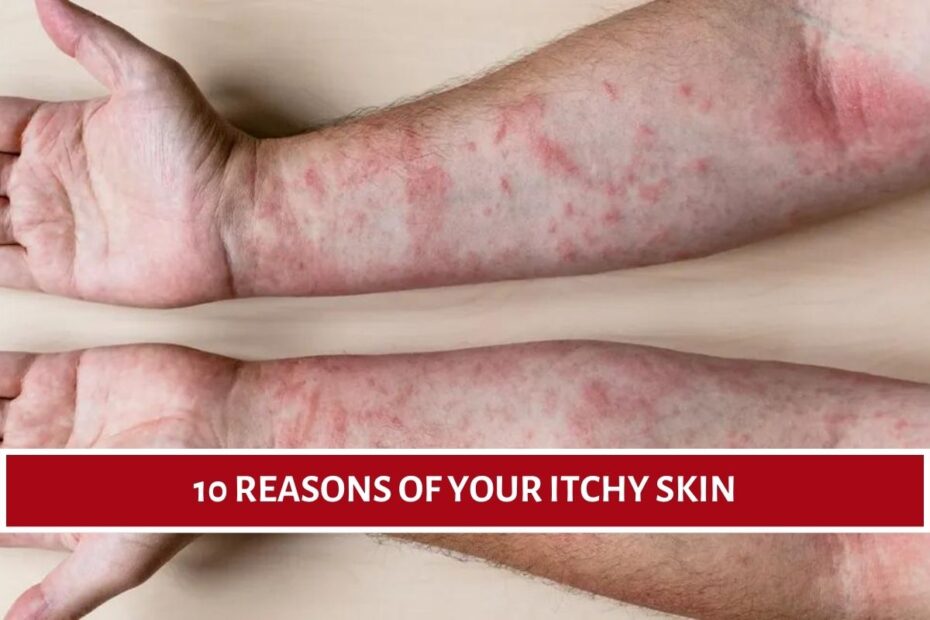10 Reasons of Your Itchy Skin:- This is called pruritus, and itchy skin can be annoying and painful. There are many things that can make your skin itch, from everyday irritants to serious health problems.
10 Reasons of Your Itchy Skin
Here are ten things that could be making your skin itch:
1. Dry Skin
One of the main reasons people itch is dry skin. Skin can get flaky, rough, and sensitive when it doesn’t get enough water. Dry skin can get worse in cold weather, low humidity, and when you wash your hair a lot with strong soaps. This kind of itching can be eased by using a good moisturizer and staying away from hot baths.
2. Allergic Reactions
Itching can be caused by allergies to foods, medicines, or things in the surroundings. Pollen, cat dander, some foods, and topical treatments are all common allergens. It is very important to find the allergy and stay away from it. Antihistamines and cortisone creams that you can buy over the counter can also help with itching caused by allergies.
3. Skin Conditions
Conditions of the skin like eczema, psoriasis, and spots are often marked by itching. Atopic dermatitis, or eczema, makes patches of skin red and swollen, while psoriasis makes skin thick and scaly. Hives look like swollen, itchy bumps. Treatment depends on the situation and may include applying creams or pills, making changes to your diet, or both.
4. Insect Bites
Bites from mosquitoes, fleas, or bedbugs can itch and irritate a certain area. Most of the time, the burning is caused by the body’s response to the insect’s saliva or poison. Using anti-itch creams, bug sprays, and keeping your living space clean can help you deal with and avoid getting bitten by insects.
5. Infections
When bacteria, fungi, or viruses attack the skin, it can make you itch. Skin conditions like scabies, athlete’s foot, and shingles are known to make skin itchy. As directed by a doctor, antifungal, antibacterial, or antiviral drugs are usually used to treat illnesses and ease the itching that comes with them.
Also See:- 9 Best Foods and Drinks to Have Before Bed
6. Contact Dermatitis
touch dermatitis happens when an allergen or irritating substance comes into touch with the skin and makes it red, itchy, and swollen. Some materials, soaps, lotions, and chemicals are often to blame. Finding the harmful drug and staying away from it are important parts of treatment, along with using soothing lotions and corticosteroid creams.
7. Chronic Diseases
Itching can be caused by long-term diseases like liver disease, kidney disease, and thyroid problems. For instance, liver disease can cause bile salts to build up in the blood, which can make the skin itchy. Taking care of the underlying problem and working with a doctor are important ways to deal with itching caused by chronic diseases.
8. Medication Side Effects
As a side effect, some medicines can make you itch. Some antibiotics, opioids, and blood pressure medicines are in this group. If you think that one of your medications is making you itch, talk to your doctor about possible options or changes to your treatment plan.
9. Stress and Anxiety
Anxiety and emotional stress can show up in the body in many ways, such as making the skin itch. Stress can make your skin more sensitive and make skin problems worse if you already have them. Managing stress through therapy, exercise, or relaxation methods can help stop itching that is caused by stress.
10. Hormonal Changes
Itchy skin can also be caused by changes in hormones, like those that happen during pregnancy or menopause. Itching during pregnancy is common and generally goes away after giving birth. It’s called pruritic urticarial papules and plaques of pregnancy (PUPPP). During menopause, changes in hormones that affect the skin’s ability to stay hydrated and stretchy may make it itch.
Conclusion
Finding the root cause of itchy skin is important for treating it and getting relief. Whether the pain is caused by dryness, allergies, infections, or something else, getting to the bottom of it and using the right methods can help. If the itching doesn’t go away or is followed by other symptoms, you should see a doctor to get a full diagnosis and a personalized treatment plan.
